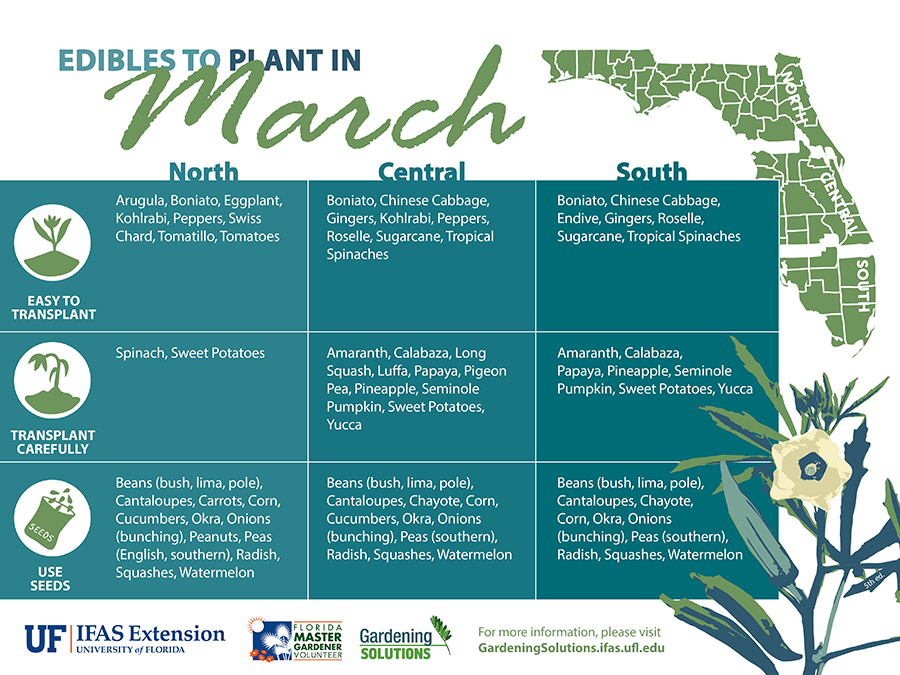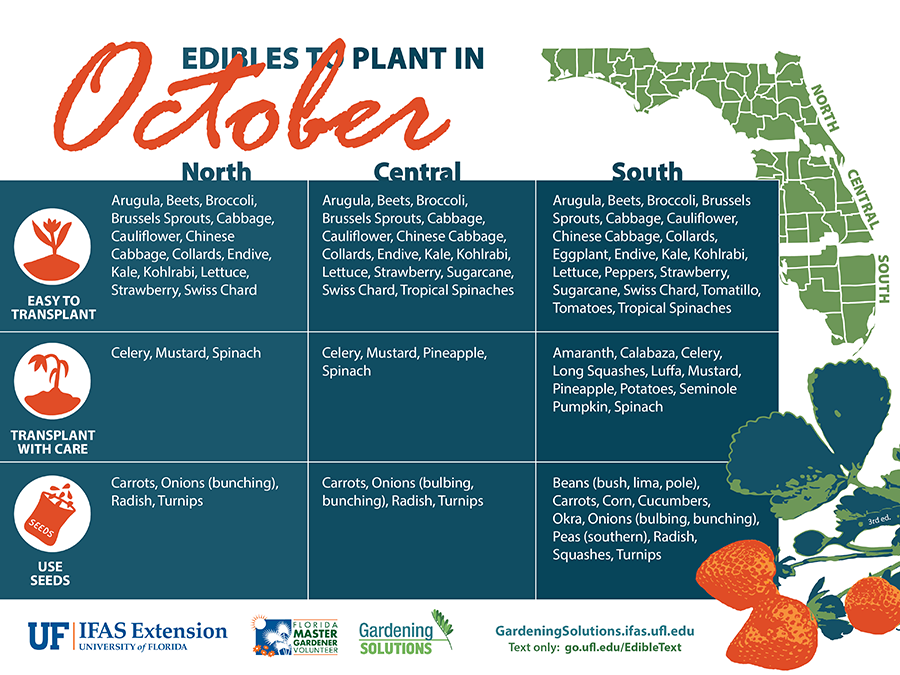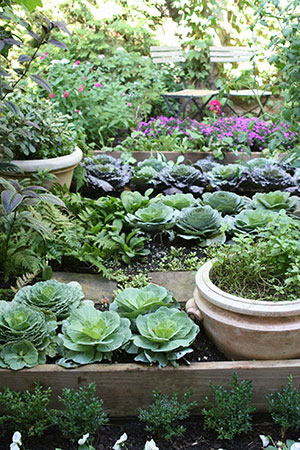Florida vegetable gardening varies by month, with September being an ideal time to start planting due to the challenges of summer. Gardeners typically begin in fall and maintain gardens until late spring.
Consider planting in a shady spot for optimal growth. In Florida, the best vegetables to grow now include sweet potatoes, southern peas, cherry tomatoes, and okra, with tropical options like cassava or Malabar spinach also thriving. With proper attention to planting dates, vegetables can be grown year-round in Florida, with warm-season options like okra, Southern peas, and sweet potatoes suitable for summer planting.
Cool-season vegetables such as broccoli, lettuce, carrots, Brussels sprouts, and radishes are ideal for October planting.
Best Vegetables To Grow In Florida
When planting in Florida, consider warm-season vegetables suited for the climate. These crops thrive in the state’s sunny and humid conditions.
Crops To Consider:
- Tomatoes
- Peppers
- Okra
- Squash
For a successful Florida vegetable garden, cool-season vegetables are ideal during the milder months. These crops can withstand the occasional cold snaps in the state.
Recommended Options:
- Broccoli
- Carrots
- Spinach
- Lettuce
Whether you opt for warm or cool-season vegetables, Florida offers a diverse range of options for year-round gardening enjoyment. Experiment with different crops to find what thrives best in your specific location!

Credit: gardeningsolutions.ifas.ufl.edu
January – March
In January through March, Florida gardeners can plant a variety of vegetables such as beets, carrots, and kale. It’s essential to consider the state’s warm climate and choose vegetables that thrive in the season to ensure a successful harvest. Following a planting calendar can help maximize yields and maintain a flourishing garden throughout the year.
Preparation And Planning
As the new year begins, it’s the perfect time to prepare and plan for your Florida vegetable gardening month by month. Evaluate your garden’s condition, remove any debris, and enrich the soil with organic matter to ensure optimal growing conditions. Consider the specific needs of different vegetables and plan their placement accordingly to maximize sunlight exposure and airflow.
Planting Schedule
January through March marks the prime time for planting a variety of vegetables in Florida. Consult a planting calendar to determine the ideal time for each crop based on your specific region. During these months, popular vegetables to plant include tomatoes, peppers, cucumbers, and leafy greens. Ensure proper spacing and depth when planting to promote healthy growth and abundant yields.
April – June
April through June is a crucial time for Florida vegetable gardening month by month. As the weather warms up, it’s essential to stay on top of maintenance tasks, ensure proper watering, and continue harvesting the bounty from your garden. This period presents a great opportunity to maximize the growth of various vegetables and herbs, making it a busy time for gardeners.
Maintenance Tips
- Inspect plants for pests and diseases regularly.
- Keep an eye on moisture levels and water as needed, particularly during dry spells.
- Prune and train vining plants to optimize space and encourage healthy growth.
- Monitor the soil pH and nutrient levels, and amend as necessary.
- Support tall or heavy plants with stakes or trellises to prevent breakage.
Harvesting
- Regularly pick ripe vegetables to encourage continuous production.
- Harvest herbs before they flower for the best flavor.
- Check for mature fruits and vegetables daily to prevent overripening.
- Store harvested produce properly to maintain freshness and flavor.
- Consider preserving excess harvest through freezing, canning, or drying.

Credit: www.revivalgardening.com
July – September
From July to September, Florida vegetable gardening thrives with opportunities to plant a variety of crops suitable for the warm season. With the right care and attention to planting dates, gardeners can enjoy a bountiful harvest year-round in the Sunshine State.
Choose from a selection of vegetables like sweet potatoes, southern peas, cherry tomatoes, and okra to flourish in the summer heat.
July – September is the peak of summer in Florida, and it can be a challenging time for vegetable gardening. The heat and humidity can make it difficult to maintain a healthy garden, but with the right strategies, you can still grow a bountiful harvest. In this section, we’ll explore some tips for dealing with the heat and humidity, as well as pest control strategies to keep your garden thriving.
Dealing With Heat And Humidity
The scorching heat and high humidity of summer in Florida can be tough on both plants and gardeners. To help your garden survive and thrive during this time, it’s important to take some extra precautions. Here are some tips to help you beat the heat:
- Water your plants deeply and regularly, especially during dry spells. Aim to provide at least 1 inch of water per week, and more during periods of extreme heat.
- Mulch your garden beds with organic materials like straw or leaves to help retain moisture and keep soil temperatures cooler.
- Provide shade for your plants with a shade cloth, or by planting taller crops like corn or sunflowers on the southern side of your garden to provide natural shade.
- Plant heat-tolerant varieties of vegetables like tomatoes, peppers, and okra, which can handle the high temperatures and humidity.
Pest Control
Summer is also a time when pests can wreak havoc on your garden. Here are some strategies for keeping your plants healthy and pest-free:
- Inspect your plants regularly for signs of pests, such as holes in leaves or chewed stems. Early detection can help prevent infestations from spreading.
- Practice good garden hygiene by removing any fallen leaves or fruit that can attract pests.
- Use natural pest control methods like companion planting, which involves planting certain crops together to repel pests or attract beneficial insects.
- If you need to use pesticides, choose organic options that are safe for the environment and won’t harm beneficial insects.
By following these tips, you can keep your Florida vegetable garden thriving through the hot and humid summer months. With a little extra care and attention, you’ll be rewarded with a bountiful harvest of fresh, healthy produce.
October – December
In October through December, Florida vegetable gardening requires planting cool-season crops such as broccoli, carrots, and lettuce. It’s also an ideal time for preparing the soil for spring planting and protecting plants from frost. With the right care, Florida gardeners can enjoy a bountiful harvest during the winter months.
October – December marks the transition period from warm-season to cool-season crops in Florida vegetable gardening month by month. This is a crucial time for gardeners to manage their soil and prepare for upcoming planting seasons. Soil management plays a vital role in maintaining the health and fertility of your garden soil. It involves practices such as mulching, composting, and adding organic matter to the soil. These practices help to improve soil structure, retain moisture, and provide essential nutrients to the plants.
Transitioning to Cool-Season Crops is the highlight of this period. This is the perfect time to start planting cool-season crops such as broccoli, cauliflower, carrots, lettuce, spinach, and kale. These crops thrive in the cooler temperatures of the fall and winter months. Gardeners should ensure that their soil is prepared adequately before planting. The soil should be well-drained, fertile, and have a pH level of 6.0-7.0.
In addition to soil management, it is also essential to follow a planting schedule and calendar. This helps to ensure that your garden is productive throughout the year. Gardeners in South Florida should plant in October, while those in North Florida should wait until November. It is important to note that the planting schedule may vary depending on your location and climate zone. Therefore, it is crucial to check your planting zone and adjust your planting schedule accordingly.
In conclusion, October – December is an important period in Florida vegetable gardening month by month. Gardeners should focus on transitioning to cool-season crops, managing their soil, and following a planting schedule. By implementing these practices, you can ensure a productive and healthy garden throughout the year. Happy gardening!
Common Challenges And Solutions
When it comes to Florida vegetable gardening month by month, there are common challenges that gardeners may encounter. However, with proper knowledge and strategies, these challenges can be effectively managed. Here are some solutions to the common challenges faced when growing vegetables in Florida:
Dealing With Pests
Pests can pose a significant threat to vegetable gardens in Florida. Common pests such as aphids, caterpillars, and whiteflies can quickly damage crops if left unchecked. To manage pests effectively, consider the following tactics:
- Implement companion planting to naturally repel pests.
- Regularly inspect plants for signs of pest infestations.
- Utilize natural predators such as ladybugs and lacewings to control pest populations.
- Apply organic pest control methods such as neem oil or insecticidal soap.
Managing Diseases
Diseases can also impact the health of vegetable plants in Florida’s varying climates. To prevent and manage diseases, consider the following strategies:
- Practice crop rotation to reduce the risk of soil-borne diseases.
- Select disease-resistant varieties when planting vegetables.
- Proper watering techniques can help prevent fungal diseases.
- Apply organic fungicides as a preventative measure against common plant diseases.

Credit: gardeningsolutions.ifas.ufl.edu
Frequently Asked Questions
What Is The Best Month To Plant Vegetables In Florida?
Plant vegetables in Florida from September to maintain gardens until late spring. Consider a shady spot for planting.
What Are The Best Vegetables To Grow In Florida Right Now?
Best vegetables to grow in Florida now are sweet potatoes, southern peas, cherry tomatoes, okra, cassava, and Malabar spinach.
Can You Have A Vegetable Garden Year Round In Florida?
Yes, you can have a vegetable garden year-round in Florida by planting according to appropriate dates.
Can You Grow Vegetables In Florida In The Summer?
Yes, you can grow vegetables in Florida in the summer, including okra, Southern peas, and sweet potatoes.
What Are The Best Vegetables To Grow In Florida?
The best vegetables to grow in Florida include tomatoes, peppers, squash, cucumbers, and sweet potatoes.
Conclusion
In Florida, gardening offers year-round benefits and fresh produce. By following a planting schedule, you can enjoy a successful vegetable garden from fall to late spring. Consider the unique challenges of Florida’s climate and choose suitable vegetables for each season.
Happy gardening in the Sunshine State!

